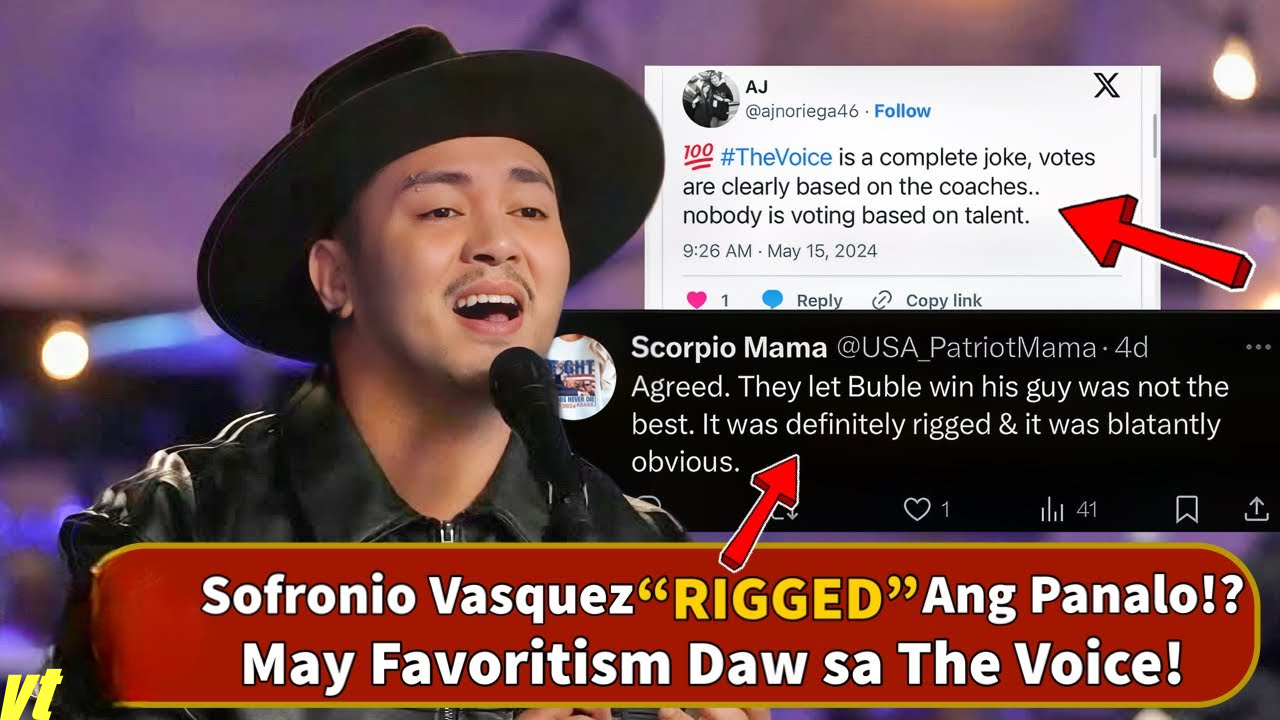The finale of *The Voice of the Philippines* was nothing short of dramatic, with Sofronio Vasquez emerging as the winner and immediately sparking controversy. As the confetti settled and the congratulations poured in, whispers of “rigged” and “daya” began to circulate on social media and among fans. The accusations centered around allegations of favoritism from his coach, Shye, leading many to question the integrity of the competition. This article explores the claims, the defense from both sides, and the broader implications of the controversy.

Sofronio Vasquez’s victory on *The Voice* was a moment of triumph for his supporters, who celebrated his incredible talent and journey on the show. From his blind audition to the grand finale, Sofronio showcased a powerful voice and undeniable stage presence, earning him a place among the show’s top contenders. However, his win was quickly overshadowed by accusations of unfairness, with some viewers claiming that his success was the result of favoritism rather than merit.
The allegations of “rigged” or “daya” surfaced almost immediately after Sofronio’s victory was announced. Critics pointed to several moments throughout the competition that they believed indicated favoritism from his coach, Shye. One of the most contentious moments was during the knockout rounds, where Shye was accused of choosing songs that highlighted Sofronio’s strengths while neglecting his weaknesses. This, coupled with Shye’s frequent praise and emotional support for Sofronio, led some fans to question whether the competition was truly based on talent alone.
Shye, however, has vehemently denied these allegations, stating that she treated all her team members equally and that Sofronio’s success was solely a result of his hard work and talent. In a statement to the press, Shye defended her decision-making process, emphasizing that she chose songs and strategies that she believed would help her artists grow and succeed. She also pointed out that Sofronio consistently received high votes from the public, which she argued was a clear indication of his popularity and talent.
The controversy surrounding Sofronio’s win has sparked a broader debate about the fairness of talent competitions like *The Voice*. Critics argue that the format of the show, which relies heavily on audience voting and coach influence, can lead to biases and favoritism. They point to instances in previous seasons where coaches appeared to favor certain contestants, either through song choices, stage presence coaching, or public endorsements. These actions, they claim, can sway audience votes and undermine the fairness of the competition.
Supporters of *The Voice*, however, argue that the show’s format is designed to reflect the realities of the music industry, where talent, charisma, and connections all play a role in success. They argue that the competition is not just about vocal ability but also about stage presence, audience engagement, and the ability to connect with fans. In this context, they believe that Sofronio’s win was a testament to his overall appeal and the hard work he put into his performances.
Sofronio himself has remained relatively quiet amid the controversy, choosing to focus on his victory and future career. In a rare interview, he expressed gratitude to his supporters and acknowledged the challenges he faced during the competition. He also thanked Shye for her guidance and mentorship, stating that she had been instrumental in helping him grow as an artist. While he did not directly address the allegations of favoritism, his comments underscored the importance of perseverance and hard work in achieving success.
For Shye, the controversy has been a test of her reputation as a coach and mentor. While she has defended her actions and decisions, the allegations have undoubtedly left a mark on her public image. In the world of reality TV, where perception is everything, even the slightest hint of favoritism can lead to backlash and criticism. Shye’s ability to navigate the controversy and maintain her credibility will be crucial as she continues her journey as a coach on *The Voice*.
The broader implications of the controversy extend beyond Sofronio and Shye, touching on the integrity of talent competitions as a whole. As more and more viewers turn to reality TV for entertainment and inspiration, the stakes for fairness and transparency are higher than ever. Shows like *The Voice* rely on the trust of their audience to remain popular and relevant, and any hint of bias or manipulation can erode that trust. The producers of *The Voice* will need to address these concerns and reassure viewers that the competition is based on talent and merit.
In conclusion, the controversy surrounding Sofronio Vasquez’s win on *The Voice of the Philippines* has sparked a heated debate about favoritism, fairness, and the role of social media in shaping public opinion. While Shye has defended her actions and Sofronio has remained focused on his victory, the allegations of “rigged” and “daya” have left a lasting impact on the show’s reputation. As the dust settles, the broader question remains: can talent competitions like *The Voice* truly be fair and unbiased, or are they inevitably shaped by the biases of coaches, audiences, and producers? Only time will tell.





